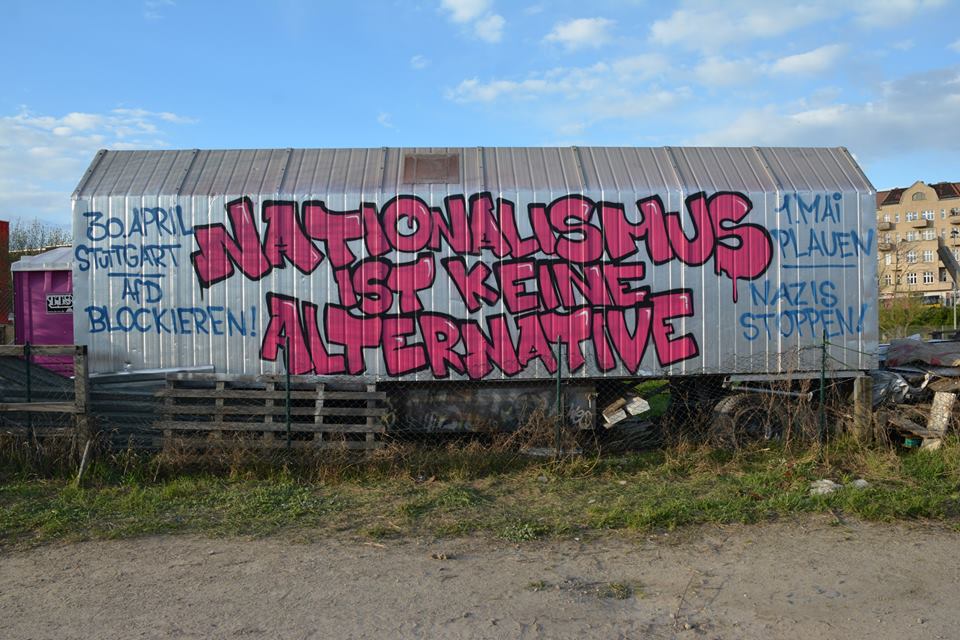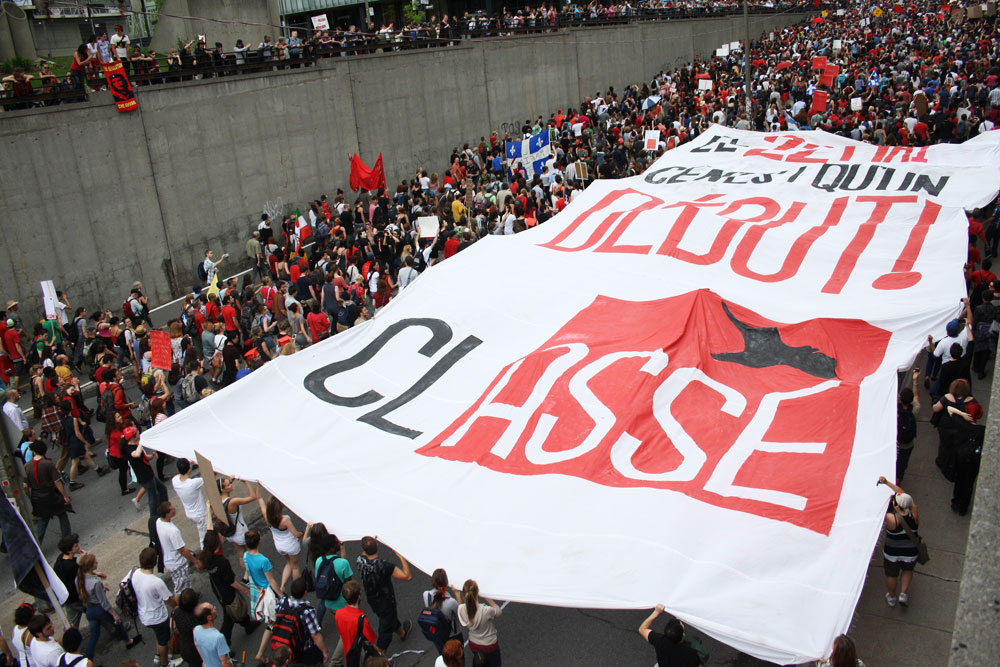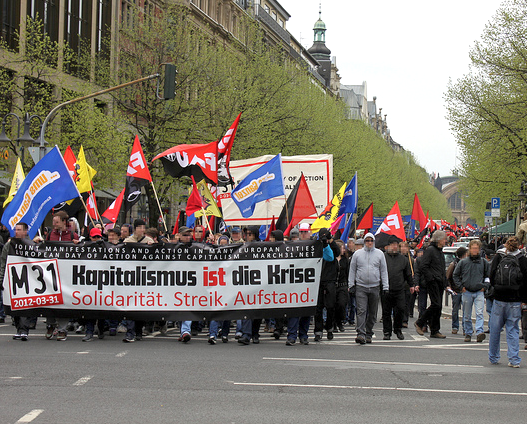A German nationwide campaign against Fortress Europe and its fans.
Below is the campaign statement of the Nationalismus ist keine Alternative (NIKA) campaign, which our comrades from the Beyond Europe platform ums Ganze! are involved in. NIKA operates as a shared slogan and website for various antifascist and antiracist groups in Germany which take both local action and collective national action against right populists, neo-nazis, and xenophobic street movements. In the context of the EU referendum and the violence and racism emanating from the far right, bolstered by the unthreatened nationalist consensus in British society, we felt that it was important to share the work being done in Germany to counter a similar wave of popular resentment against migration. For more of an idea about the current situation one of our members recently interviewed Kritik und Praxis (Frankfurt) on the current wave of far right action in Viewpoint Magazine.
The current political situation: a swing to the right in Europe and Germany
The political situation in Europe has currently come to a crisis in a way that seemed unimaginable for many people only a year ago. With the defeat of Greece’s SYRIZA government last summer, the public regarded the crisis as solved for the moment. Proving that assumption wrong, the instability of the global capitalist system immediately returned to Europe’s collective consciousness, especially to countries like Germany, which benefited from the crisis, virtually by foot: as the autonomy of refugees, who vanquished all borders, as the crisis of the Border Regime. The response hasn’t all been negative: indeed, more people than ever before participate in refugee relief and anti-racist structures and actions. Meanwhile though, racists and nazis attack refugee accommodation on an almost daily basis, right-wing parties are celebrating unforeseen successes, bourgeois parties keep tightening asylum laws, and signs in Europe are pointing to a comprehensive national partition.
At first glance, the situation in Germany looked similar to the early Nineties. In contrast to nowadays, many hoped for the globalized market to bring a new widespread wealth back. 25 years later, all the glamour is gone. The neoliberal promise has only come true for the already rich – nobody else still believes in it. Aside from that, Southern Europe sinks into misery, and Eastern Europe into ultranationalist rhetoric. Even in Germany, the crisis’ beneficiary, the white middle class supposes itself to be on the decline. Aggressively, it holds fast onto the few social and ideological placebos the authoritarian capitalist state offers as compensation. Insecurity and fear are the prevalent reactions. This situation has produced those who manage to be anti-social and conformist at the same time – who exploit each other and simultaneously knuckle under the boss. It becomes apparent to everybody, regarding the so-called migration crisis, that this world is very unstable.
The AfD and their supporters
The right-wing party „Alternative für Deutschland /AfD“ ( English: Alternative for Germany ) is the most successful organized manifestation of the connection between classism and nationalism. It is a product of the reintroduction of German nationalism during the Euro-crisis, which made narrow-minded nationalism socially acceptable again. When the AfD recognized that anti-Euro(pean) propaganda alone wouldn’t be enough to win elections last summer, it ceased its demands about European politics and aligned more with the centre-right CDU (Christian Democratic Union, which is the governing party Chancellor Angela Merkel belongs to). The public swing to the right, which took place during the migration debate last summer, allowed the AfD to readjust their focus on asylum policy, without directly being labeled as radical right-wing. Despite the fact that the previously so-called ‘conservative-liberal’ wing has left the party when it split last year, it managed to keep parts of its bourgeois image while, at the same time, gaining popularity in the right-conservative and radical right-wing faction. Unfortunately, institutionalisation gets more likely with increasing successes in elections; this again could lead to a more widespread reception of their positions. Thereby, an interrelation clearly exists between the party and the seemingly unpolitical – in fact nationalist – environment that is hegemonic in parts of Germany. If we want to effectively push back this nationalist coalition, we have to become active on all levels, and also support the initiatives in more rural areas opposing the nationalist hegemony, like we did on the first of May in Plauen (Saxony). But that alone won’t be enough: by discrediting the AfD’s positions both substantially and practically, we want to prevent the institutional stabilisation of bourgeois racism in general; thus, the coming elections in several federal countries as well as the elections for the Bundestag (German parliament) in 2017 are of great importance. Because the AfD wins votes beyond the usual radical right-wing faction due to their bourgeois image, it is vulnerable at exactly this point, especially in Western Germany. It is only possible to attack the AfD in public for something that is already normal in the rest of society: reducing fleeing and migration to an economic calculation, in which Germans should come first. At the same time, by discrediting their position, we can also sabotage established parties. They hold the same strategies, trying to poach voters from the AfD by adapting some of their positions and thus legitimising them. Nevertheless, the attack on the AfD as the current organisational spine of the nationalist movement is not enough: beyond that, we also have to attack the players on the neoliberal political centre-ground and especially the state’s deportation regime.
About Fortress Europe and how to destroy it
The dying continues. Hundreds are drowning trying to reach the Italian coastline, Slovenian cops are shooting refugees in their back at the border, Turkish border patrols are shooting at children, because they want to cross the border ‘without permission’ – the murderous border regime of Europe is at work again. The sickening headlines of the last weeks spell out two facts. Firstly, how successful the fortress’ fans currently are. Pushed by the nationalism of the AfD and their allies, the public dialogue moves to the right. The first fruits of this endeavour have been last year’s numerous tightenings of the asylum law. Secondly, the last weeks show how efficient the German government’s efforts have been to relocate the borders and thereby the ugly pictures to the EU’s periphery. On the one hand, large parts of German society basically agree with the principle of utility-racism, and thus the idea that people who don’t profit the economic locale have to be kept away from here. On the other hand, they feel uncomfortable with the immediate and bloody violence towards refugees. In contrast to their obviously racist colleagues, the majority of the Germans that have embodied this utility-racism still don’t want to be faced with dead immigrants. Willing to keep the pretence of humanity and nevertheless saving the contemporary German business model, the costs of this success have to be outsourced (again). For this goal, even a deal with a dictator like Erdoğan is regarded as legitimate. Reluctantly, it is recognized that he’s leading a war against the Kurdish movement, doesn’t give a damn about human rights and isn’t exactly the lackey Germans wish for. But without nasty bouncers, nobody can enjoy their privileges undisturbed nowadays. The outcome? The number of people who manage to make it through to us decreases – and, as if through that things are made better, it is announced as a success.
We only have to withstand some ‘tough images’ for a few weeks, then the migration crisis could be over, says the Chancellor’s Interior Minister. The dead will not be washed up on to our coasts, and those who have yet to make it to Europe’s centre will get along with the help of a few investments and new regulations. Nevertheless, people will keep on coming. They will also keep on dying, if we don’t engage the border regime’s administrators. This could be among (if not being) the most crucial of tasks for a radical left in the heart of European Capitalism. We should understand it as a chance: it was also the continuous work of antiracist initiatives, and a long mobilisation of refugees themselves, which broke the nationalist consensus against migrants and forced some concessions from Merkel last summer. This is why we want to confront the players shielding themselves from the results of their inhumane deeds, expose the profiteers of the Border Regime, and interrupt the standard operation at its heart. To reach that goal, we have to organise the resistance of the still large solidaristic part of society, by finally making the issue of (closed) borders and shielding from reality into a perceptible political conflict. This is not only an ethical question: a humane perspective for all can’t take place inside a national framework. Against the Right, a left offensive still is the most effective remedy, so let’s do ourselves a favour and break the nationalist consensus!




